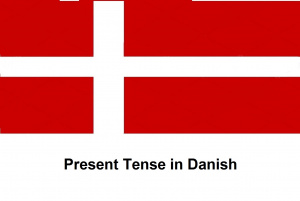Difference between revisions of "Language/Danish/Grammar/Present-Tense"
Jump to navigation
Jump to search
m (Improvement (and simplification) of the explanation of how the present tense is conjugated) |
|||
| Line 1: | Line 1: | ||
[[File:The Present Tense in Danish.jpg|alt=The Present Tense in Danish|thumb|The Present Tense in Danish]] | [[File:The Present Tense in Danish.jpg|alt=The Present Tense in Danish|thumb|The Present Tense in Danish]] | ||
Hello everybody, | Hello everybody, | ||
In today's lesson you will | In today's lesson you will learn how to use '''"THE PRESENT TENSE"''' in Danish. | ||
Feel free to edit this page by adding new words and expressions ! | Feel free to edit this page by adding new words and expressions ! | ||
In Danish, the conjugation of verbs is the same across all pronouns. | In Danish, the conjugation of verbs is the same across all pronouns. | ||
| Line 26: | Line 19: | ||
The Pronouns are : | The Pronouns are : | ||
{| class="wikitable" | {| class="wikitable" | ||
!'''<big><u>ENGLISH</u></big>''' | !'''<big><u>ENGLISH</u></big>''' | ||
!'''<big><u>DANISH</u></big>''' | !'''<big><u>DANISH</u></big>''' | ||
!'''<big><u> | !'''<big><u>PORTUGUESE</u></big>''' | ||
|- | |- | ||
| | | | ||
| Line 65: | Line 58: | ||
|} | |} | ||
Using the example of "at gå" (to go): | |||
{| class="wikitable" | {| class="wikitable" | ||
!'''<big><u>ENGLISH</u></big>''' | !'''<big><u>ENGLISH</u></big>''' | ||
!'''<big><u>DANISH</u></big>''' | !'''<big><u>DANISH</u></big>''' | ||
!'''<big><u> | !'''<big><u>PORTUGUESE</u></big>''' | ||
|- | |- | ||
| | | | ||
Revision as of 12:27, 17 January 2022
Hello everybody,
In today's lesson you will learn how to use "THE PRESENT TENSE" in Danish.
Feel free to edit this page by adding new words and expressions !
In Danish, the conjugation of verbs is the same across all pronouns.
The infinitive verbs always end in -e, and are always preceded by the phrase "at". For example: "at gå", meaning "to go" or "to walk".
To form the present tense, you have to add -r to the verb, and replace the "at" with the correct pronoun depending on your subject.
The Pronouns are :
| ENGLISH | DANISH | PORTUGUESE |
|---|---|---|
| I | JEG | EU |
| YOU | DU | VOCÊ |
| HE | HAN | ELE |
| SHE | HUN | ELA |
| WE | VI | NÓS |
| YOU (PLURAL) | I | VOCÊS |
| THEY | DE | ELES |
Using the example of "at gå" (to go):
| ENGLISH | DANISH | PORTUGUESE |
|---|---|---|
| I GO | JEG GÅR | EU VOU |
| YOU GO | DU GÅR | VOCÊ VAI |
| HE GOES | HAN GÅR | ELE VAI |
| SHE GOES | HUN GÅR | ELA VAI |
| WE GO | VI GÅR | NÓS VAMOS |
| YOU (PLURAL) GO | I GÅR | VOCÊS VÃO |
| THEY GO | DE GÅR | ELES VÃO |
